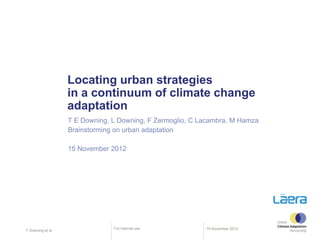Benchmarking urban adaptation
- 1. Locating urban strategies in a continuum of climate change adaptation T E Downing, L Downing, F Zermoglio, C Lacambra, M Hamza Brainstorming on urban adaptation 15 November 2012 For internal use 15 November 2012 T Downing et al.
- 2. Abstract Urban planning is a particular entry point for climate change adaptation. As its own community of practice, it comes with visions and procedures, concepts and definitions, and frameworks. In working with this community, as with any end-user, our aim is to develop solutions that fit within their reference points. To this end, we are developing: • Five entry points that correspond to different stages in a continuum of adaptation • Benchmarking each entry point in terms of urban planning with examples from around the world • Initial assessments of where we expect a sample of cities we are working with to be located in this continuum • A set of strategies that are appropriate to each entry point, taking the location in the continuum as guidance for urgent priorities and competence in moving forward T Downing, C Lacambra
- 3. Brainstorming a continuum of adaptation Key: Dashed: baseline Solid: early action Double: vision and future strategy Prepare for additional climate change impacts Build capacity for climate change adaptation Manage Enhance spatial current planning for disaster risks future risks Ensure basic planning services
- 4. Benchmarks For each entry point… • Ensure basic planning services • Manage current disaster risks • Build capacity for climate adaptation • Enhance spatial planning for future risks • Prepare for additional climate change impacts There are different requirements and strategies… Moving forward from one level to the next is a choice…
- 5. Working on a template Strategy name [photo/graphic] Rationale Benchmark/use case Good practice example/reference [place] [sector] Objective Activities Outcomes * * * * * *
- 6. Illustrative example Document incidences of local flooding Flooding ranges from major disasters along rivers to local hot spots of inundation during intense rainfalls. Building up a picture of where flooding occurs helps people to understand the many aspects of the hazard, as well as who is vulnerable and what can be done. Dar es Salaam Oxford developed a data base of weather-related With very little relief, local flooding ties up traffic as events, compiled from newspapers and interviews well as damages key infrastructure with key managers. The data helped identify impacts, but also recorded what managers felt they could do to reduce the economic cost of short-term events. It has been helpful in mainstreaming adaptation within existing maintenance and infrastructure budgets. Objective: Monitor local flood impacts and Lead stakeholder: City of Dar es Salaam, supported responses by key agencies, beginning with an by relevant ministries and in association with the historical baseline of events since 2000. University of Dar es Salaam (commissioned to develop the reporting template and baseline) Activities Outcomes * Develop baseline and template for reporting * Shared, documented data base of weather-related * Record events as they occur over a 3 year test flood events including estimates of impacts and project responses * Produce an annual review to validate the data and * Raised awareness and initial procedures for disseminate early lessons learned reducing flood damages within existing agencies and budgets





![Working on a template
Strategy name [photo/graphic]
Rationale
Benchmark/use case Good practice example/reference
[place] [sector]
Objective
Activities Outcomes
* *
* *
* *](https://image.slidesharecdn.com/benchmarking-121115084502-phpapp01/85/Benchmarking-urban-adaptation-5-320.jpg)
